The Detroit DD15 engine is widely recognized in the heavy-duty trucking industry for its remarkable endurance and prolonged service life, making it a practical and cost-efficient alternative for demanding trucking activities. Its unparalleled power, efficiency, and dependability offer companies the necessary means to ensure seamless operation.
It's crucial to learn how to properly care for and preserve the aftertreatment system, particularly the DPF filter if your fleet is equipped with one of these engines. Keep reading for essential information about the Detroit DD15 DPF filter.

The Detroit DD15 engine is a top pick for heavy-duty trucking companies due to its unwavering performance and fuel efficiency. Boasting a massive 14.8-liter displacement and a range of power outputs up to 505 horsepower, the DD15 is a formidable engine capable of handling a broad range of applications, from long-haul transportation to heavy-duty construction and mining.
Its advanced engineering features, including a robust engine block and a high-pressure fuel system, contribute to its exceptional durability, reliability, and impressive fuel economy. The DD15 engine is designed to deliver smooth and consistent power, making it an ideal choice for those who demand both performance and fuel efficiency from their vehicles.
The Diesel Particulate Filter Role in the Detroit DD15's Aftertreatment System
The diesel particulate filter is a crucial component of the Detroit DD15 engine's aftertreatment system, responsible for capturing and eliminating particulate matter (PM) emissions, commonly referred to as soot, from the exhaust gases before they are released into the environment.
Typically composed of ceramic or metallic materials, the DPF is designed to trap PM emissions on its surface. The accumulated PM is then periodically eliminated through a process known as regeneration, which cleans it and restores its performance. As an integral part of meeting emissions regulations and reducing the environmental impact of heavy-duty trucking operations, this requires regular cleaning and maintenance to ensure its proper function and durability.
Neglecting to clean and maintain this can result in clogging, reduced engine performance, and higher emissions. It is essential to prioritize the proper upkeep to prevent these issues from arising and to ensure optimal engine performance and minimal environmental impact.
Overcoming Maintenance & Cleaning Challenges for Detroit DD15 DPF Filters
Regularly cleaning and maintaining DD15 Detroit Diesel filters can present significant challenges for heavy-duty trucking companies. One of the main obstacles is ensuring that they are cleaned consistently. The accumulation of soot and other contaminants on the filter's surface can lead to clogging, which can decrease the filter's effectiveness and increase emissions.
Another challenge is to clean them in a way that is both safe and effective, without causing any harm. Some cleaning methods, such as abrasive blasting or the use of harsh chemicals, can cause substrate damage and ultimately lead to premature failure. It is vital to select a cleaning method and solution that is compatible with the particular DPF filter in use, as different filters may be a better fit for either a thermal or aqueous cleaning method.
Heavy-duty trucking companies must also keep up-to-date with the latest emissions regulations and ensure that their aftertreatment systems meet the required standards. Maintaining and cleaning Detroit Diesel DPF DD15 filters can be a complex task, but it is essential for the engine's performance and longevity, as well as to meet emissions regulations.
Maintaining Detroit DD15 DPF Filters for Optimal Engine Performance & Longevity
Regularly cleaning and replacing the Detroit DD15 filter is critical to ensuring the overall performance and longevity of the engine. A clogged DPF can lead to reduced engine performance, increased emissions, and even engine damage. To maintain performance and prevent clogging and damage, it is essential to clean these filters regularly.
This not only helps to meet emissions regulations but also prevents costly repairs or replacements in the future. Regular cleaning can also extend the filter's service life, resulting in significant cost savings for the heavy-duty trucking company.
Fleets must adhere to the appropriate service interval for each engine and filter. Regular monitoring of the DPF filter's back pressure, soot load, ash buildup, and other parameters can also help to predict when cleaning is necessary.
By following these guidelines and best practices, heavy-duty trucking companies can ensure that their Detroit DD15 engines continue to perform at optimal levels and meet emissions regulations, while also saving money in the long run.
Cleaning Machine vs Replacement: Choosing the Best Option for Your Detroit DD15 DPF
Heavy-duty trucking fleets have to decide whether to use a DPF cleaning machine or replace their Detroit DD15 filters entirely, taking into consideration their cost-effectiveness. Although replacing this can be a significant expense, a new one will be in perfect condition and may be necessary if the old one has not been cleaned regularly. On the other hand, using a cleaning machine can extend the service life, reducing the frequency of replacements and providing long-term cost savings.
Moreover, using a cleaning machine can improve the overall performance of the engine, reduce emissions, and result in additional cost savings in terms of fuel consumption and maintenance. It is also vital to consider the environmental impact of replacing them frequently, as it can generate more waste and pollution. The cost of a cleaning machine can be spread over time, as it can be used to clean countless filters, while the cost of replacing one must be incurred every time.
To determine the best option, heavy-duty trucking companies must evaluate their specific needs and the frequency of the replacements. Companies with a high number of filters in need of cleaning may find a DPF cleaning machine to be a worthwhile investment, while those with a smaller fleet or less frequent replacement needs may find that sending their filters to a quality cleaning shop is the better option.
It is crucial to weigh the pros and cons of each option and make a decision that will maximize the performance and longevity of the engine while minimizing costs.
The Importance of Proper DPF Maintenance to Avoid Consequences
Heavy-duty trucking companies must understand the consequences of improper maintenance of diesel particulate filters. Neglecting cleaning and maintenance can result in several issues that can impact the engine's performance and the company's bottom line. Clogging can increase exhaust gas backpressure, leading to decreased engine performance, poor fuel efficiency, and expensive engine damage.
Additionally, the engine may enter "limp mode,” reducing power output to prevent damage but limiting the truck to a top speed of 5 miles per hour. Insufficient maintenance can also result in increased downtime for vehicles, reducing productivity and increasing costs for the company.
To avoid these negative consequences, heavy-duty trucking companies must regularly maintain and clean DPFs to ensure optimal engine performance, meet emissions regulations, and avoid financial stressors. Proper maintenance will help reduce downtime, increase productivity, and save money by extending the service life.
Benefits of Investing in a Specialized DPF Cleaning Machine for Your Fleet
Investing in a specialized cleaning machine can bring numerous benefits for heavy-duty trucking companies looking to maintain their filters and ensure optimal engine performance. One of the main advantages is the ability to effectively clean and restore filters to their optimal condition on the fleet’s schedule, reducing downtime and improving engine performance.
With the use of advanced technology and specialized cleaning solutions, these machines can remove soot and other contaminants that have accumulated on the filter's surface, leading to cost savings for the company by extending the filter's service life.
Understanding the Difference: Thermal & Aqueous DPF Cleaning Machines
When it comes to cleaning diesel particulate filters, there are two main types of DPF cleaning machines: thermal and aqueous. Each type has its advantages and disadvantages, and the choice of which one to use depends on various factors, including the type and condition.
Thermal cleaning machines use high temperatures to clean and regenerate the filter. They are designed to operate at a specific temperature and are calibrated to provide a thorough cleaning. While some machines are just modified kilns, Filtertherm® thermal cleaning systems have smart features that make cleaning faster and more efficient.

However, thermal cleaning is not appropriate for all filters, especially those with unusual shapes, which may require cutting and re-welding to remove all residual ash. The total time to clean DPFs with a thermal system can be upwards of 24 hours.
Aqueous cleaning machines, on the other hand, use water and proprietary surfactants to clean filters without the need for long bake cycles. The low-pressure, high-volume water system in the Filtertherm® Aqueous DPF Cleaning Machine is effective at removing soot and other contaminants, making it ideal for cleaning a variety of shapes and sizes.

Aqueous cleaning is also the perfect choice for odd-shaped DPFs, as the water flow can wash out filters with unusual angles without needing to cut and re-weld them. The total time to clean a DPF with an aqueous system can be as little as 6 hours.
In summary, while both thermal and aqueous DPF cleaning machines have their benefits and drawbacks, the choice of which one to use depends on various factors, including the type and condition. Heavy-duty trucking companies should consider their specific needs and consult with Filtertherm® experts to determine the most appropriate cleaning method.
Common Issues With DD15 DPF Filters: Troubleshooting & Diagnosis
Detecting and diagnosing common problems with Detroit Diesel DD15 particulate filters can be a challenging task. The most frequent issue is clogging, which occurs when soot and other impurities build up on the filter's surface. To identify clogging, it is crucial to monitor the pressure drop and soot load, as well as take note of any unusual engine performance or emissions problems.
Another typical issue with DPF filters is malfunctioning caused by a range of factors, such as a loose clamp or gasket, a sensor failure, or a downstream issue. To diagnose malfunction, it is necessary to check for diagnostic trouble codes (DTCs) and check the operation of O2, NOx, PM, and pressure sensors.
Finally, it’s essential to consider the duty cycle of the DD15 engine. Some fleets may use their trucks for long-haul loads, while others may use them for local or regional routes. Knowing the duty cycle of the engine could help diagnose issues such as frequent regen attempts or fast-than-expected soot buildup.
Regular monitoring of DPF filter performance and observing any unusual engine performance or emissions issues can help detect problems early and prevent them from worsening. Moreover, using sophisticated diagnostic tools, such as a DPF pressure gauge and soot load sensor, can aid in identifying and troubleshooting filter problems.
It is also essential to consult the manufacturer's recommendations and guidelines for diagnosing and resolving any problems that may arise.
Choosing the Best DPF Filter Replacements
When it comes to replacing Detroit DD15 filters, there are many options available, but choosing the right one can be a challenge. While purchasing an OEM unit offers guaranteed quality and fitment, it can be expensive, especially for fleets.
However, aftermarket brands like Redline Emissions Products offer a cost-effective solution without sacrificing quality. Their filters are manufactured in the USA and tested to OEM standards or better. Additionally, REP DPFs feature the patent-pending Born on Weight™, which indicates the exact weight in grams when brand-new.
This feature is useful for future cleanings as it allows for comparison between the Born on Weight™ and the after-cleaning weight to ensure the cleaning was thorough.
Maintaining & Cleaning Your Detroit DD15 DPF Filters: Essential for Optimal Performance

Proper maintenance and cleaning of Detroit DD15 Filters are crucial for ensuring optimal engine performance and longevity in heavy-duty trucking operations. DPF filters play a critical role in reducing emissions and meeting regulations, and regular cleaning and replacement are necessary to ensure their proper function.
By prioritizing the maintenance and cleaning of their filters, companies can benefit from improved engine performance, increased fuel efficiency, reduced emissions, and cost savings in terms of maintenance and repairs.
Investing in a Filtertherm® cleaning machine system, or finding a cleaning shop that uses Filtertherm® machines, can help heavy-duty trucking companies improve the performance and longevity of their engines while reducing emissions and saving money.
Additionally, regular monitoring, troubleshooting, and following the manufacturer's recommendations can also help to ensure that the DPF filters are in good condition. Heavy-duty trucking fleets need to prioritize the maintenance and cleaning of their Detroit DD15 filters to ensure optimal engine performance and longevity.
Now that you know how to properly care for your Detroit DD15 filters, check out the selection of high-quality OEM and aftermarket parts for your entire aftertreatment system available on DPFPartsDirect.com. We’re committed to helping your DD15s run smoothly and last for decades. Request a Quote from us today!


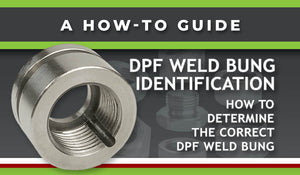
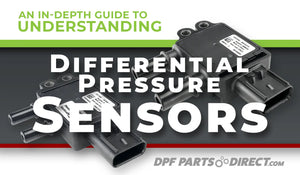
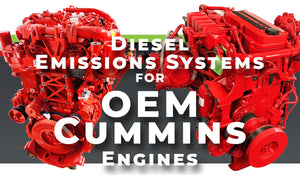
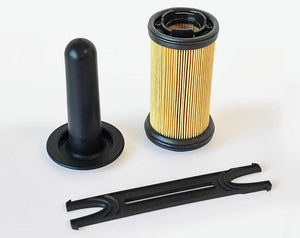
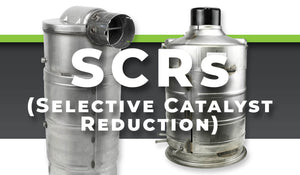


Comments 0